"Until we win this war, the only easy day is yesterday."
"In space no one can hear you scream ... unless it is the battlecry of the United States Marines."
"The story is about the futility of revenge. We're trying... to deal with what war is about.
We're looking at how our guys, as soldiers, see the war.
Jim and I see this not so much as an SF piece as kind of a WW II movie or a war piece in space."
-Glen Morgan (Starlog Magazine #220, p.43-44)-



Following the trajectory of writing excellence that began with The X-Files (1993-2002), the wonderful work of Glen Morgan and James Wong continued with Millennium (1996-1999) and culminated in a darling project of theirs called Space Above And Beyond (1995-1996).
It was Morgan and Wong's great care and oversight as show runners on Millennium Season Two that really inspired much of the theme of my writing contribution to the thoroughly engrossing book Back To Frank Black: A Return To Chris Carter's Millennium (2012). That publication coupled with The X-Files and Millennium led me to analysis all things Morgan and Wong with regard to television. Space Above And Beyond was missed along the way.

Space Above And Beyond is unfortunately a victim of its era when it comes to visual effects. It was the dawn of computer generated graphics and Morgan and Wong's serial was the beneficiary of the then revolutionary approach to expand the science fiction universe.
Space Above And Beyond, thanks to the evolution of such aids, suffers in the same manner Babylon 5 (1993-1998) suffered. Time would not be its friend. Practical effects and hands-on production work remains unaffected and remarkably strong.

The X-Files' judicious use and limited reliance on such computer effects were minimal by comparison allowing that series to feel almost timeless. But one look at Space Above And Beyond and there are visuals that do not fair well particularly in the early portion of the Pilot. Things do improve. For a genre that relies so heavily on suspending your disbelief, this series does not benefit from the weak performance of the early era computer-generated worlds. In my estimation the viewer works hard to prevent the shattering of this space illusion.
Pushing those visuals aside and moving beyond that, Space Above And Beyond rockets into space on the merits of its writing by Morgan and Wong. It excels as a science fiction war drama steeped in compelling, real characters of the mold Morgan and Wong were creating on The X-Files.

For Morgan and Wong the truth really was out there with Space Above And Beyond. There were taking their eye for a good story, ear for dialogue and the tone of The X-Files and taking us out into space.
In many respects, Morgan and Wong were bringing their own brand of credibility to the genre with Space Above And Beyond as much as they did for The X-Files, Ufology, the paranormal and government conspiracy through its FBI agents. Morgan and Wong fuse their space drama with American politics through the eyes of combat pilots all of it with a nod to the likes of Robert A. Heinlein who served in the military himself.

The gritty Space Above And Beyond takes the ideas for Morgan and Wong to the next level. This is the next logical step beyond The X-Files. Aliens are a reality. These vulnerable cadets are aware of their existence. It's no longer a secret, the truth was out there and now we are preparing for war against them.
The men behind Space Above And Beyond, Episode 1 and Episode 2, Pilot write for a selection of interesting characters even if they seem a little awkward in the outset. You have such faith in Morgan and Wong's credentials as writers based on the beloved The X-Files and the sensational work written for Millennium you're willing to give them the benefit of the doubt.

Kristen Cloke, who plays Captain Shane Vansen, would go on to star as Lara Means in the wonderful second season of Millennium. As one of the principals of Morgan and Wong's ensemble cast, Morgan's real life wife is one of the main reasons to check out the series. Fans of her work and of Millennium would be wise to check out her contribution to the earlier aforementioned book, Back To Frank Black, titled Here's My Thing: A Conversation With Kristen Cloke. She offers excellent insight into both Millennium and Space Above And Beyond.

Other principals to bolster the series include Rodney Rowland as outsider and In Vitroe 1st Lt. Cooper Hawkes and Morgan Weisser as 1st Lt. Nathan West. Rowland guested in The X-Files, S4, Ep13, Never Again and Veronica Mars (2004-2007), while Weisser appeared in The X-Files, S4, Episode 7, Musings Of A Cigarette Smoking Man. Finally, the exceptional James Morrison is featured as Lt. Col. Tyrus Cassius "T.C." McQueen. The actor is known for his contribution to Millennium, S1, Ep3, Dead Letters and The X-Files, S7, Ep14, Theef.
Another casting highlight to Space Above And Beyond includes a powerhouse guest performance in the Pilot by retired USMC R. Lee Ermey as the pilots' boot camp instructor. Ermey is always a commanding presence and steals the show in each scene with his memorable seemingly improvisational presence. He delivers a riveting balls-to-the-wall, Full Metal Jacket-inspired contribution. If you enjoyed his improvised role as Gunnery Sergeant Hartman in Full Metal Jacket (1987) by the late Stanley Kubrick, you won't be disappointed by his turn as Sergeant Major Bougus here. He owns it. Ermey actually guest-starred in The X-Files, S3, Ep11, Revelations also directed by David Nutter, who directs the Pilot here. Ermey would later star in Morgan and Wong's Willard (2003).

Space Above And Beyond capitalizes on a strong militaristic style with the inclusion of Ermey along with a percussive score by Shirley Walker who drives this thing with just the right amount of patriotic pomp and circumstance.
Overall, Space Above And Beyond has a very real quality to its science fiction and tough military drama. Rather than just mere blockhead bravado, the characters are infused with intelligence and guts. Emotional baggage or damages and a revealing history is given to a number of the leads.

That reality is put to the test immediately within the Pilot as two pilots/lovers trained are torn asunder by American politics only to have one forced to remain behind.
Director David Nutter, referred to as "the pilot whisperer," brings his steady hand to the series creating a gritty marine look for the cadets. Nutter delivers for the first three installments of Morgan and Wong's twenty-four episode series. Nutter has loyally worked wth Morgan and Wong on many occasions for The X-Files (Ice, Beyond The Sea, Tooms, Blood, 3). He also delivered big for the Millennium Pilot (1996), as well as pilots for Terminator: The Sarah Connor Chronicles (2007) and Roswell (1998).

A great deal of planning and forethought went into seeding the series by Morgan and Wong as they develop a deep mythology for their space epic. Vansen's parents were Marine Corps officers working for the Artificial Intelligence War, but were killed by the AI patrol. Vansen has nightmares about it and those frightening scenes are revealed in flashback.
Space Above And Beyond, terrible CGI aside, feels like a natural heir to the spirit of space wars and colonial warriors first portrayed so memorably in Glen A. Larson's Battlestar Galactica (1978-1979). In fact, it may serve as a natural link in the evolution of the space drama between that series and Ronald D. Moore's even harsher, reimagined Battlestar Galactica (2003-2009). Despite uniformly entertaining performances like those found in those aforementioned series, Space Above And Beyond lasted a mere single season like the classic Battlestar Galactica, but never attained the cult or iconic status visually that Larsen's series managed.

Production design is strong on the series. Interiors and living quarters aboard marine space vessels mirror the tight conditions inside of submarines.
The Mars landing, too, is covered with red sands and eerie lighting and makes for a suspenseful, dramatic finale of hand to hand combat against the enemy resulting in a capture.
The combat unit is dubbed the 58th Squadron "Wildcards" and are adorned with green space suits that are immaculately conceived in their detail with each soldier's name affixed to the top of their helmets for viewer identification. All the gear and weaponry is perfectly complementary of that expected of solidiers in a coming war. The outfits reminisce of Paul Verhoeven's Starship Troopers (1997) and thus the muscular look of Robert Heinlein's designs for his book of the same name, Starship Troopers (1959). Yet Space Above And Beyond pre-dates Verhoeven's film by two years.

Ship designs are perfect as they balance the line of practical and futuristic whereby a future Earth has progressed technologically, but not outside the realm of possibility. There's an originality to the vessels that also steers clear of the traditional Viper, X-Fighter and UFO-styled designs.
Morgan and Wong utilize popular music to great effect in the series as well. This approach echoes their immaculate use of music and pop for The X-Files and Millennium.
Morgan and Wong expertly generate an eerie atmosphere in the series opener. They excel in it. Adding to the tension is the fact the 58th Squadron Wildcards are a little green and inexperienced---a little wet behind the ears to be dealing with a hardened enemy.

Morgan and Wong are also wise to ensure the alien remains shrouded in mystery within a space combat suit a la Predator (1987). There are nice touches though like throbbing gill-like entry points on the foreign combatant. Sticking with practical effects in one scene a creature gushes green slime from its orifices.
There is also a mournful tone in Space Above And Beyond suggesting a long war with real losses and men and women complete with human empathy.
The future involvement in the war is nicely established when the legendary Angry Angels are sent to combat the enemy. The mythic Angry Angels, the 127th, are considered the best of the best but ultimately they fall to a superior enemy. When some return bloodied and battered, a good deal of hope seems lost from the eyes of the 58th. This is World War II in space. Casualties and losses are a reality the cocksure pilots are suddenly forced to face with stark, sobering realism. For a moment even, a vulnerable Bougus salutes his cadets.

Later, in the second portion of the Pilot entry, the space sequences are far more credible thanks to the attention paid to the digital details. The FX shots are superior to earlier shots in the entry as if greater attention was paid. The fighter squadron, flying their SA-43 Endo/Exo-Atmospheric Attack Jet Hammerhead fighters, docks with its intended location, the U.S.S. Saratoga.
The young marine cadets are addressed by one of the survivors of the Angry Angels, a now facially scarred Lt. Col. Tyrus Cassius "T.C." McQueen.

The series is filled with beautiful human moments thanks to the writing caliber of scribes like Morgan and Wong. Whether a sensitive moment between Vansen and Hawkes, or an unspoken moment of understanding between them there is no shortage of humanity here. These characters grow and express that growth. It's not too fast and it is subtle. There were times when it seemed Hawkes was very much alone within the group, but the orbit of acceptance within his team moves a little closer as they prepare for war. Hawkes knows West will have his back despite earlier words during simulation drills when West expressed hostility toward the then apathetic Hawkes. "What would you die for?" asks McQueen of Hawkes and Hawkes comes to realize he would die for his fellow soldier. Like the old adage leave no one behind or we find for the man next to us is the reality.

One scene between Hawkes and McQueen is beautifully moving by the end of our story. It's damn near poetic.
Space Above And Beyond is filled with the building blocks of a new science fiction mythology set in 2063 centered on the 58th Squadron Wildcards based on the USS Saratoga. These pilots command SA-43 Endo/Exo-Atmospheric Attack jet fighters also called Hammerheads. Each pilot has a call sign. Space is being colonized by Earth. Terraforming is achieved by reaching destinations through wormholes. Earth's Marine Corps pilots in the form of the untested 58th battle an alien enemy at these converging points. The enemy is referred to as Chigs, short for ugly little Chiggers (fleas that burrow under the skin).

Thematically Space Above And Beyond explores rascism and class-structure in its future form. This is handled through natural birth versus gestated birth. Gestated children are essentially farmed in tubes and grown until eighteen years of age, and were once exclusively created to battle the Chigs. In Vitroes are referred to derogatively by others in society as Tanks and Nipple-necks. The In Vitroes have become the underclass. Originally artificially created androids called Silicates were at the lowest end of the social structure, but they attained intelligence and rebelled against their creators like Cylons.

It fearlessly taps into societal ills whereby mandated quota programs and other race-based organizations are actively promoting reverse rascism, in effect, setting back years of progress of efforts to normalize race relations in America. Morgan and Wong approach this one way ahead of its time. It's actually a smartly-penned series, but not one easy to digest or appreciate given its heavy political and cultural overtones combined with dense mythology.
Myth arc stories begin with the ongoing Chig War. Throughout the arc the group of pilots is put to the test allowing for stories to explore the human condition and attributes such as loyalty, courage, trust and love. Other human responses to the affects of war throughout the series include revenge, loss, fear, sacrifice, desperation and hope.

Previous to the Chig War, the AI war (2047-2057) took place and many of the plotlines allude to this war and deal with the aftermath of it via the Silicates. The Silicates not only took to outer space, but are part of the motivating force and psychological make-up to the Shane Vansen character given their decision to murder her parents.
In Vitroes as humans born in gestation tubes are pitted against those born embryonically inside a mother. In Vitroes are referred to as tanks by others as well as tanks in much the same way the word nigger has been implemented derisively against African-Americans by others and continues to be used by Afro-Americans themselves. Rascism, prejudice, freedom and mutual respect is at the heart of this complex social thread within Space Above And Beyond. It's made very clear in the early going issues will be handled head on.

The Aero-Tech and UN thread delves into the concept of the military industrial complex within this military-heavy space series as well as political intrigue and conspiracy. It's all rather complex and a second viewing is helpful in clearing confusion.
Space Above And Beyond is a serious entry in the world of science fiction, military-based dramas. For those who enjoy the more serious leanings of their sci-fi wars in the vein of Battlestar Galactica, this may be for you. It lacks the joking, cartoon-based adventures of something like Stargate SG-1 (1997-2007) and plays it relatively straight. This is very much in the spirit and tone of Morgan and Wong. The three charismatic leads in the series heading the 58th have just the right touch to draw us into the characters. This underrated series may be a surprise to some and yet not quite compelling for others sensitive to more contemporary sci-fi like the new Battlestar Galactica or Defiance (2013-2015).

Based on the Pilot alone the series clearly promised to attempt something special and more substantive, but like Firefly (2002) didn't find the audience. Interestingly it never found one even when the likes of Firefly did (the Browncoats).
Space Above And Beyond had the potential to develop its intended five year run, but as it stands it remains but a mere footnote within the genre by two special writers that gave us some of the smartest genre television ever in Millennium and The X-Files.
Pilot.
Writer: Glen Morgan, James Wong.
Director: David Nutter.


Cast of The 58th Squadron a.k.a. Wildcards:
Kristen Cloke (Captain Shane Vansen)
Morgan Weisser (1st Lt. Nathan West)
Rodney Rowland (1st Lt. Cooper Hawkes)
Joel de la Fuente (1st Lt. Paul Wang)
Lanei Chapman (1st Lt. Vanessa Damphousse)
James Morrison (Lt. Col. Tyrus Cassius "T.C." McQueen).


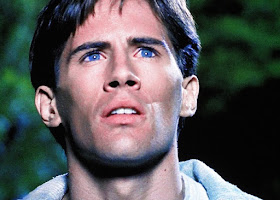

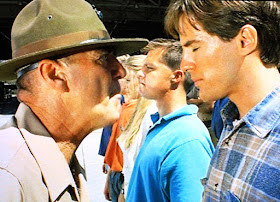







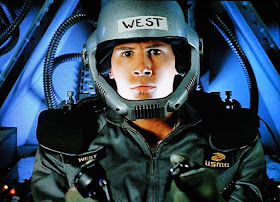














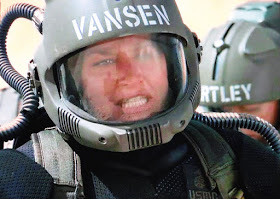







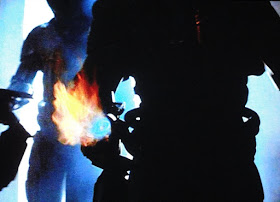














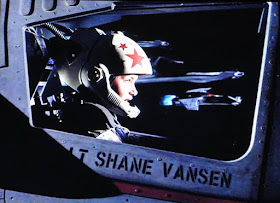









No comments:
Post a Comment